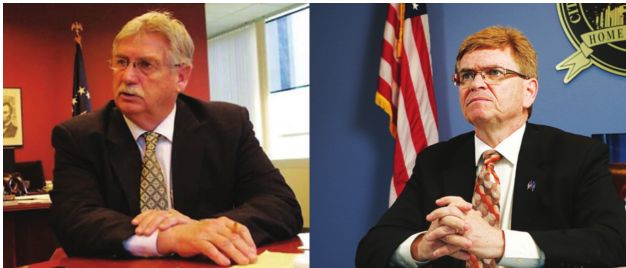
Contest pits incumbent against former alderman
It’s been a dozen years since Springfield has seen a two-horse mayoral race.
In 2007, incumbent Tim Davlin shellacked Bruce Strom, who got less than 40 percent of the vote, both in the primary and the general election. In 2011, seven mayoral candidates crowded the primary ballot; in 2015, there were five. And now, we are, again, down to two, with former alderman Frank Edwards being the only candidate to file against Mayor Jim Langfelder, who never has had a close call at the polls.
Before winning the mayor’s post in 2015 with 55 percent of the vote, Langfelder had last faced an opponent in 2003, when he got nearly 60 percent in his first of three successful bids for treasurer.
Edwards says he figures he’s the underdog, but that’s true of anyone running against an incumbent. He says he can’t think of anything that the mayor’s done well; Langfelder says he’s done plenty.
The candidates’ views also diverge on money.
Edwards, whose campaign committee filed organization papers last week, predicted a $300,000 price tag for his campaign, with the tab for both candidates exceeding $500,000. The mayor, who spent nearly $200,000 in 2017 and had $52,000 on hand at the end of September, projected his campaign budget at $100,000, noting that there will be no primary before the April 2 general election.
Edwards has been in the mix since October, when he attended a meeting at headquarters for Laborer’s Local 477, whose business manager, Brad Schaive, at the time said he was trying to find candidates to challenge Langfelder. Edwards declined to tell Illinois Times who attended the meeting, Schaive could not be reached for comment.
Rosemarie Long, chairwoman of the Sangamon County Republican Party, said that the GOP doesn’t plan to issue an endorsement in the nonpartisan race. “But that doesn’t mean we won’t work to support him,” Long said. Edwards, who got party support when he ran for city treasurer in 2015, said he expects labor support in the mayor’s race.
The mayor chuckled when asked whether he and Schaive have exchanged Christmas gift wish lists. “We’ve never exchanged Christmas gifts,” Langfelder said before praising Schaive for being an effective union leader. “He’s a great leader for his group,” the mayor said. “I have to represent 115,000 people.”
Langfelder downplayed the importance of organized labor’s support of his 2015 candidacy. “I owe the victory to the voters of Springfield,” the mayor said. “They were one of many groups that helped out.”
Edwards last appeared on a municipal ballot in 2015, when he was beaten by Misty Buscher, who’d never before run for elective office and won the treasurer’s office with 55 percent of the vote over the veteran officeholder. “I can’t explain that, to be real honest with you,” says Edwards, who allows that he may have underestimated his opponent. “I didn’t work as hard as I should have. I wasn’t out there fighting the battle that I should have fought, educating the people like I should have done.”
This time, Edwards says, will be different. “I think it’s going to be an all-out fight,” he says. Edwards criticizes Langfelder for pushing through tax hikes. “I see people leaving, I see job loss,” Edwards says. “Our town’s dying. And yet our taxes keep going up.”
Edwards says the city should be able to balance books from efficiencies as opposed to raising taxes, and he says he’d instill an immediate hiring freeze if he’s elected. “Our finances are in terrible shape,” he says. “If we’re raising taxes, why are we hiring people?” Edwards also says that crime is an issue, pointing to a real-estate website called neighborhoodscout. com, which scores cities on crime and says that Springfield is a four on a 1-to-100 scale, with 100 being safest, making the capital city more dangerous than East St. Louis, which got a six, and Chatham, which was rated at 82. Edwards said that he has not examined crime statistics published by the U.S. Department of Justice, which show that both violent crime and property crime rates in Springfield have remained essentially flat between 2014, the year before Langfelder took office, and last year, the most recent year for which statistics are available.
Edwards wouldn’t say whether he’d replace police chief Kenny Winslow, who was on the wrong end of a no-confidence vote by officers last year. “I’m not prepared to say that right now,” Edwards said. He said he didn’t have a position on whether the city properly handled the case of Samuel Rosario, an officer fired in 2017 after getting into a fistfight with a man who had exchanged insults with the officer. Edwards said it wouldn’t be appropriate to comment on the case of Sgt. Gary Wangard, who is under investigation after a woman was shot in October, five days after the sergeant was captured on video telling an arrestee that the woman’s son had been an informant.
Edwards said he can’t think of anything that Langfelder has done well. “I’ve tried to come up with something,” Edwards said. “That’s why I’m running for mayor.”
“Evidently, he hasn’t followed city government very well,” Langfelder responded. The mayor pointed to the city’s successful effort to persuade the legislature to enable renewal of the downtown tax-increment financing district as one of many accomplishments. He also said he’s made hard decisions such as pushing for Bicentennial Plaza and demolition of the YWCA building on a now-vacant block with a purpose yet to be determined.
“The hard decision was bringing down the Y – I took the hit on it, now people see the magnificence of the (governor’s) mansion,” said Langfelder, who added that Edwards, while an alderman, voted to purchase the property without first getting an appraisal. “We’ve been making the tough decisions and really moving plans forward.”
Contact Bruce Rushton at [email protected].